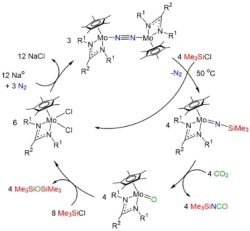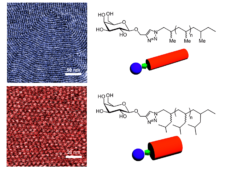
Education
- B.S. (Honors), Chemistry, 1981, Carnegie Mellon University, Pittsburgh, PA B.S.(honors) June 1981
- Ph.D., Organic Chemistry, 1985, Massachusetts Institute of Technology, Cambridge, MA (w. Satoru Masamune).
- Postdoctoral, 1985-1986, Massachusetts Institute of Technology, Cambridge, MA (w. Richard R. Schrock).
Professional Experience
- Professor, Department of Chemistry and Biochemistry, University of Maryland, 2002-present
- Associate Dean for Faculty, Research and Diversity, College of Chemical and Life Sciences, University of Maryland, 2005-2006
- Associate Professor, Department of Chemistry and Biochemistry, University of Maryland, 1999-2002
- Assistant Professor of Chemistry, University of Chicago, Chicago, IL, 1994-1998
- Senior Research Fellow, California Institute of Technology, Pasadena, CA, 1990-1994
- Assistant Professor of Chemistry, Carnegie Mellon University, Pittsburgh, PA 1987-1990
Research Interests
Transition and Main Group Metal Inorganic and Organometallic Chemistry, New Synthetic Methodology, Catalyst Development, Polymers, Chemically-Tailored Surfaces and Interfaces, Molecular and Mesoscopic Self-Assembly, New Nanofabrication Processes
Major Recognitions and Honors
- Beckman Young Investigator (1995–1998)
- Camille Dreyfus Teacher-Scholar (1995-2000)
- Visiting Scholar, Institute of Molecular Science, Japan, 1996
- College of Chemical and Life Sciences, University of Maryland, Faculty Research Award, 2003
- NSF Special Creativity Award (2004–2006)
Representative Publications
- Kuzminski, B. R. S.; Fischbach, D. M.; Yap, G. P. A.; Sita, L. R. Migratory Insertion into a Hafnium-Phenyl Bond and a Ligand-Assisted Mechanism for Reversible Chain Transfer in the Living Coordinative Polymerization of Olefins. Organometallics 2022, online, DOI: 10.1021/acs.organomet.2c00364.
- Wentz, C. M.; Fischbach, D. M.; Sita, L. R. Stereomodulation of Poly(4-methyl-1-pentene): Adoption of a Neglected and Misunderstood Commercial Polyolefin. Angew. Chem. Int. Ed. 2022, on-line, DOI: 10.1002/anie.202211992 (editor designated Hot Paper).
- Burkey, A. A.; Fischbach, D. M.; Wentz, C. M.; Beers, K. L.; Sita, L. R. Highly Versatile Strategy for the Production of Telechelic Polyolefins. ACS Macro Lett. 2022, 11, 402-409.
- Nowak, S. R.; Lachmayr, K. K.; Yager, K. G.; Sita, L. R. Stable Thermotropic 3D and 2D Double Gyroid Nanostructures with Sub-2-nm Feature Size for Scalable Sugar-Polyolefin Conjugates. Angew. Chem. Int. Ed. 2021, 60, 8710-8716 (editor designated Hot Paper).
- Wallace; M. A.; Burkey, A. A.; Sita, L. R. Phenyl-terminated Polyolefins via Living Coordinative Chain-Transfer Polymerization with ZnPh2 as a Chain Transfer Agent. ACS Catal. 2021, 11, 10170-10178.
- Wallace, M. A.; Sita, L. R. Temporal Control over Two- and Three-State Living Coordinative Chain Transfer Polymerization for Modulating the Molecular Weight Distribution Profile for Polyolefins. Angew. Chem. Int. Ed. 2021, 60, 19671-19678 (editor designated Very Important Paper).
- Wallace, M. A.; Sita, L. R. Multi-state Living Degenerative and Chain Transfer Coordinative Polymerization of a-Olefins via Sub-Stoichiometric Activation. ACS Catal. 2021, 11, 9754-9760.
- Wallace, M. A.; Wentz, C. M.; Sita. L. R. Optical Purity as a Programmable Variable for Controlling Polyolefin Tacticity in Living Coordinative Chain Transfer Polymerization: Application to the Stereomodulated LCCTP of a,w-Nonconjugated Dienes. ACS Catal. 2021, 11, 4583-4592.
- Lachmayr, K. K.; Wentz, C. M.; Sita, L. R. An Exceptionally Stable and Scalable Sugar-Polyolefin Frank-Kasper A15 Phase. Angew. Chem. Int. Ed. 2020, 59, 3563-3567.
- Lachmayr, K. K.; Sita, L. R. Small Molecule Modulation of Soft Matter Frank-Kasper Phases: A New Paradigm for Adding Function to Form. Angew. Chem. Int. Ed. 2020, 59, 1521-1526 (editor designated Very Important Paper).
Applied Catalyst Science and Technology

New scientific and technological breakthroughs in the development of more energy-efficient and environmentally-benign industrial processes must be made today in order to meet the enormous demands of a rapidly growing world population that is expected to reach 10 billion people in just less than 35 years. Research being conducted by the Sita Group is focused on the discovery, development, and implementation of a new generation of molecular catalysts and atom-economical catalytic transformations that can produce the commodity chemicals and advanced materials that civilization critically depends upon – while reducing environmental impact and human health concerns. The underlying mission of our research program is to not only contribute to the establishment and validation of new scientific paradigms and principles, but also, we seek to translate our discoveries into new materials and technologies that can potentially have near-term beneficial impacts on society. More specifically, our research involves elucidation of the fundamental principles that govern the structure and bonding of transition-metal inorganic and organometallic complexes. We then apply this knowledge to the design and validation of new classes of molecularly-discrete and highly efficient catalysts that can provide direct access to commodity chemicals and advanced materials from readily-available and inexpensive industrial feedstocks.
Finally, our efforts involve a material science and engineering approach to the development of new classes of polymeric materials that can serve as the platform for advanced technologies. Given these objectives, research training of group members involves an exciting mix of state-of-the-art experimental techniques, including the synthesis and handling of air-sensitive compounds and homogenous solution catalysis under reactive gas conditions, and a plethora of analytical and characterization tools, including high field NMR (on 400, 500 and 600, 800 MHz spectrometers), DSC, TGA, GPC, AFM, TEM, SEM, DSL, X-ray (single crystal), WAXS, SAXS, and GISAXS.
Current Research Projects



